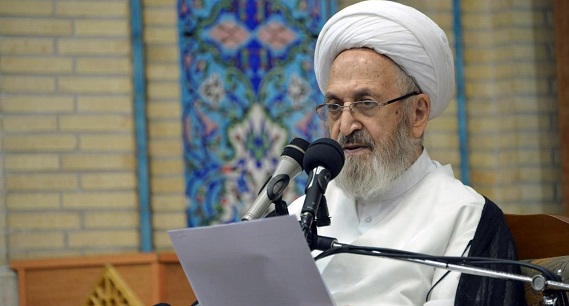Elaboration On Muslim Theologists’ View About The Argument Of Necessity And Probability

As reported by the public relations of Xorasan Seminary, among the series of conferences on new theology problems presented in Navvab Great Seminary, ayatollah Sobhani pointed to the view of Muslim theologists about the argument of necessity and probability and said that the argument has been criticized by a number of western philosophers like Hume, Kant, and John Stuart Mill.
He added that they take three stands on the spoken word the first of which says that a necessarily existent God will come along with two contradictory predications.
This marja started analyzing the criticism and said that the base of it is that necessity in philosophy is considered a monosemy with the meaning of innate necessity used in essential primary predication and since the predicate is the same or part of the subject, therefore, predicating this to that will be necessary.
He added that while this type of necessities deals with the world of concepts, another referent for necessity copes with the objective outside world.
Ayatollah Sobhani described the second criticism as follows. Implication of causality in the outside world is not correct. He explained that Hume and Kant believe that causality must be restricted to role and meaning. In other words, the meaning of causality is one thing being prerequisite to the existence of another as it is the case in all materialistic interactions. However, causality as one thing creating another from nothing and therefore proving some metaphysic existence that has created the whole world is not compatible with the known meaning of causality and its common usage.
Analyzing this criticism, he pointed that causality is among axiomatic concepts that everyone understands and that an entity is the reason for the existence of another in a way that the other one will not exist without it. He said that as an example, when someone moves a cane with his hand, although both movements happen at the same time, one considers the movement of the cane depended on the movement of the hand and considers the latter as the cause for the prior. This is what normal people understand from causality, and this is what a believer theologist considers as the only meaning for it.
This marja called the chain of unlimited causes the third criticism and explained that they say that one of the main dangers and gaps interfering the necessity and probability argument proving the existence of God is the possibility of the chain of the causes being unlimited itself. As a result, there are two ways to explain the existence one of which is the stoppage of causes where the thing is the cause and not caused and that is the way chosen by believers.
He added that the second way considering the mentioned criticism is that the chain of causes can be unlimited and if we accept it, there will be no flaw in the existent world.
Ayatollah Sobhani pointed that hypothesis of the chain of causes being unlimited is irrational. He explained that each one in this chain has no existence, nature, or attribute due to being depended and gets them all from the previous cause. Naturally, each of them is innately zero and with the previous cause gets over it.
Pointing that the state of being zero and not having any real attribute is true for each one in this chain although being unlimited, he said that such a chain that unstoppably moves back and does not reach a self-existent is innately zero. Now, the question is that how unlimited zeros abruptly turned into an integer and created the world while piling poverty will not result in richness.
Related News

Today We Need Cultural Jihad
As reported by the public relations of Xorasan Seminary, in the conference of “the vitalityRead More

Elaboration On Muslim Theologists’ View About The Argument Of Necessity And Probability
As reported by the public relations of Xorasan Seminary, among the series of conferences onRead More

